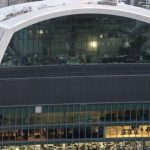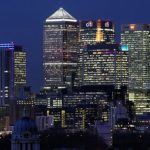Qatar: Buying Britain by the pound
It’s hard to walk round London and admire the sights without admiring something paid for by Qatar.
From some of the most famous hotels and landmarks to the cranes arcing over the South Bank, Qatar has a substantial finger in a huge number of pies.
The UK is Qatar’s single largest investment destination, with £35bn in place and another £5bn on its way in the next five years.
And it is now said that Qatar owns more land in London than the Queen.
The next batch of £5bn is headed for sectors ranging from infrastructure and energy to IT.
However, the pace may be slowing slightly after a rapid acceleration in the last five to 10 years, and Qatar’s focus is turning instead to the US, where it aims to invest some $35bn (£27bn).
Both here and in the US, the investments will be largely channelled through the Qatar Investment Authority (QIA) the country’s sovereign wealth fund, that has a global portfolio worth about $335bn.
And it all comes from gas.
Qatar’s oil output is relatively modest. But it is, through happy geological coincidence, situated on top of the South Pars Field, the single largest known natural gas field in the world, which straddles the Gulf.
Canary Wharf
The property research company Datscha revealed that the QIA owns 879 commercial and residential properties in London.
Of that, about 26 million sq ft is commercial property.
Central to its property empire is the Canary Wharf Group (CWG), which it bought with partners Brookfield Property Partners in 2015 for £2.6bn.
CWG owns some 16 million sq ft in the heart of London, including 20 Fenchurch Street, nicknamed the Walkie Talkie, and the Shell Centre redevelopment on London’s South Bank.
The QIA separately bought the HSBC Tower at 8 Canada Square in 2014 for £1.1bn.
It also has a stake in London’s Savoy Hotel (through owning 10% of the French hospitality group Accor), and a 95% stake in the Shard. It bought the Harrods department store for a reported £1.5bn in 2010.
Meanwhile, Qatari Diar, the QIA’s real estate development unit, is busy converting the US Embassy on London’s Grosvenor Square into a luxury hotel, and is building homes at the former Chelsea Barracks which it markets as “the most coveted 12.8 acres in the world.”
Qatari Diar also has a partnership with the real estate investment company Delancey and the Dutch pension fund asset manager, APG to develop and rent the 2012 Olympic Athletes’ Village, known as East Village, and the Elephant and Castle redevelopment.
In all, that’s about 4,000 residential units, managed and leased through the Get Living brand.
Hotels
Another unit of the QIA, Qatar Holding, owns a string of hotels in London – not just any old hotels, but Claridge’s, the Berkeley and the Connaught, as well as the Intercontinental in Park Lane, through a 64% stake in Coroin, the holding company which owns the Maybourne Hotel Group.
Across England and Wales, Datscha estimates the rateable value of all the QIA’s properties is more than £1bn. Rateable value is not how much the properties are worth – it’s based on the rentable value, so it represents the rent that could be charged in a year on all the properties.
Qatari individuals have also pumped money into London real estate. No 1 Hyde Park is a 380,000 sq ft development of some 83 apartments, considered by some to be the most expensive address in Europe.
It is joint owned by the CPC Group and Sheikh Hamad bin Jassim bin Jaber al-Thani, former prime minister and minister of foreign affairs of Qatar.
An investigation by Vanity Fair in 2013 found that 64 of the apartments were held by companies registered in offshore tax havens.
Gas supply
Qatar is also bound into the UK economy through trade. And for Qatar, trade means liquefied natural gas (LNG).
The distinctive LNG “Dinosaur Egg Carriers” which have helped make Qatar one of the richest nations on earth
Natural gas makes up about 29% of the UK’s fuel imports and of that, about 29% is in the form of LNG, transported in double-hulled, temperature-controlled ships, such as the distinctive “Dinosaur Egg Carriers”.
Qatar provides nearly all the UK’s LNG. It comes through the South Hook Terminal at Milford Haven, which is 67.5% owned by Qatar Petroleum.
Then there are the strategic stakes in some of the country’s biggest corporate names. The QIA has bought 22% of Sainsbury’s and 20% of London Heathrow airport.
S
ince July last year, Qatar Airways is the biggest shareholder in British Airways owner IAG, with a 20% stake.
Controversies
These kinds of investments do not come without a degree of controversy.
The Chelsea Barracks site has had a chequered history after Prince Charles lambasted the modernist design and the whole project was put on ice until 2015.
More serious is the cloud hanging over Qatar’s interests in Barclays bank. At the height of the financial crisis in 2008, Qatar and Abu Dhabi pumped some £7.3bn into Barclays bank as it attempted to avoid being bailed out by the UK government, Qatar paying £4bn.
But the manner in which Barclays raised the funds is being scrutinised by two UK regulators, the Financial Conduct Authority and the Serious Fraud Office, and there is a separate lawsuit in which the private equity company PCP Partners is claiming £700m from Barclays in allegedly unpaid fees.
Qatar Holding is not under investigation. It still holds 6% of Barclays.
The country has also been making inroads into other areas of UK banking.
In 2009, the Qatari Investment Bank bought 44% of the venerable London stockbrokers Panmure Gordon.
Earlier this year, it made what it called a “joint bid” with Atlas Merchant Capital – the private equity firm of former Barclays boss Bob Diamond – to “take Panmure Gordon private and reposition the company as a key boutique investment bank in the UK market”.
IMAGES:
The Walkie Talkie, part of the Canary Wharf Group Image copyright GETTY IMAGES
Claridge’sI mage copyright MAYBOURNE HOTEL GROUP Claridge’s – owned through the Maybourne Hotel Group
The distinctive LNG carrier Image copyright GETTY IMAGES
The Chelsea Barracks siteImage copyright GETTY IMAGES The Chelsea Barracks site – a chequered history
For more on this story go to: http://www.bbc.com/news/business-40192970









